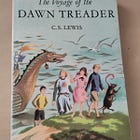Return to Narnia: part VII – The Last Battle
Plus some reflections on revisiting Narnia.
The Last Battle
Katherine Langrish writing in From Spare Oom to War Drobe. Travels in Narnia with my Nine Year-Old Self opens her chapter on The Last Battle with a summary that echoes my own experience.
Of all the Narnia books, The Last Battle was the one I liked least. I read it perhaps only two or three times compared with countless re-readings of the others, because I found it disturbing. It’s a book in which absolutely everything goes wrong, at least until the very end, and whether the ending truly succeeds in putting things right is open to question.
There’s an air of foreboding right from the very beginning. These are the last days of Narnia, Trinian is the last King of Narnia. The first character we meet, Shift the Talking Ape is unpleasant, Puzzle the Donkey is too easily manipulated. Aslan seems to have abandoned Narnia. The trees are being felled, animals are being sold into slavery. All is not well in Narnia. Even when Jill and Eustace arrive, and young readers might assume that all will be well, victories turn out to be not quite as victorious as expected. And then there are the repeated references to the possibility of a train crash in England. It’s a book about faith and belief, false gods and true ones, and what happens at the end of worlds.
Katherine Langrish again:
Lewis is a genius at making ideas accessible to children. But in this book he pushes the message too hard. At the end he becomes a catechist rather than a storyteller, and for me at least, the spell breaks.
As a child, the final chapter felt like a cheat to me. It still does. It works allegorically but is it really a satisfying ending to a fantasy series for children?
Some reflections on revisiting Narnia
People have VERY strong opinions on the reading order! I explained in my first post that I would be following the chronological order and why I’d chosen to do that. I agree with everyone who feels that a child’s first encounter with Narnia should probably be via The Lion, The Witch and The Wardrobe, but I also wonder if as adults we get more hung up on the ordering than is strictly necessary. I can’t actually remember in what order I first read them and Katherine Langrish’s introduction was The Silver Chair and it clearly didn’t diminish her childhood love for the series. Magic is magic, in whatever order you encounter it.
My fondest memories were of The Magician’s Nephew and The Lion, The Witch and The Wardrobe. I don’t know whether to be pleased or concerned that my taste doesn’t seem to have changed since the age of about eight!
The allegorical elements range from a relatively subtle, thought provoking but light touch theology, to the literary equivalent of being hit round the head with a heavy object. I prefer Lewis at the light touch end of the spectrum and some of the more heavy handed allegorical sections did yank me too far out of the story to be satisfying.
Rereading as adult made me appreciate Lewis’ attention to detail – Narnia is brought to life through descriptions of landscape and place, as well as engaging the senses in sounds, smells, sights, textures and tastes. This isn’t the detailed world building of say, J.R.R .Tolkien, but it does bring the stories to life at a child’s level.
The other area that people have VERY strong opinions on is how Lewis should be judged for the elements of his books which are deemed to be casually racist (see The Last Battle and The Horse and His Boy), misogynistic (largely the ‘problem of Susan’ – see The Silver Chair and The Last Battle) or otherwise displaying attitudes usually described as ‘of his time’. I can’t deny that there were sections of the books where I winced and wished Lewis had chosen a different form of words. Putting it down to being of the 1950s lets Lewis off the hook a little bit too easily in my opinion but individual readers can come to their own conclusions.
The big surprises were how much I enjoyed Prince Caspian, a book I didn’t have a particularly clear memory of; how funny Lewis can be, and quite how many battles there are across the books. (This last one is a pretty clear case of selective memory, battles and fighting aren’t really my thing so it’s no surprise that they didn’t stick in the mind.)
Finally, thank you to all the readers who’ve stuck with me through this series of Narnia posts. Your insightful comments, shares and likes have been both encouraging and thought provoking.











I'm obviously an oddity because I did like The Last Battle as a child, at least the ending - I agree the earlier part is uncomfortable and grim but then the contrast with the trumphant end is all the greater. It's never bothered me that it's allegory, and I actually like the bit with the dwarves (even though I'd be a dwarf myself).
One thing I've realised reading your series is how differently even Narnia fans react to the books!
Last time through, I found The Last Battle a much more compelling read than I expected - but then, that was with the heavy-handedness already priced in. (The bit about the dwarves 'refusing to see' treads far closer to the most small-minded version of Christianity than is normally the case with Lewis.) Certainly as a child I found the early parts creepy, and the later ones a bit mystifying.